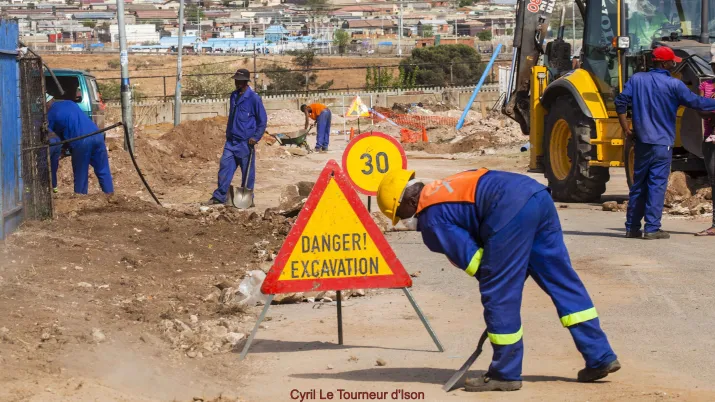 Legal notice EU (project) Reducing spatial inequalities is a priority for the Colombian government, which uses a public policy tool – the General Participation System (GPS) – to achieve this objective. This research project aims to analyse the impact of the GPS strategy on reducing spatial inequalities in Colombia, in partnership with the research center Acción Pública.
Legal notice EU (project) Reducing spatial inequalities is a priority for the Colombian government, which uses a public policy tool – the General Participation System (GPS) – to achieve this objective. This research project aims to analyse the impact of the GPS strategy on reducing spatial inequalities in Colombia, in partnership with the research center Acción Pública.
Context
In Colombia, the oil and coal mining industry is an important source of fiscal revenues, including royalties. The Sistema General de Participaciones (or General Participation System, GPS) has therefore been set up to organise the transfer of these royalties – that come from the exploitation of non-renewable natural resources – from the Ministry of Finance and Public Credit to territorial entities. These resources finance the provision of services in the sectors of education, health, drinking water and basic sanitation, general purpose and special allocations, in the different regions of Colombia. This mechanism aims at ensuring a fair distribution of income, which is essential since spatial inequalities in terms of access to services are still significant in Colombia – as shown by the multidimensional diagnosis of inequalities carried out with the support of AFD. For example, while in urban areas, the secondary education coverage rate is close to 100%, it is 50% in rural areas.
The Strategy for monitoring, follow-up and control of the resources of the GPS is a public policy tool led by the Ministry of Finance and Public Credit to carry out control over the management of the resources transferred. This strategy, in implementation for almost 15 years, identifies alerts and cases of non-compliance with the goal of assuring continuity, coverage and quality in the provision of public services. This seeks to prevent and mitigate risks in the provision of social services throughout Colombia, which is essential for the construction of equity across the country, as well as to prevent territorial gaps from widening with regards to the institutional capacities of local governments and to the provision of social services for all populations, regardless of their location.
This project is part of the Extension of the EU-AFD Research Facility on Inequalities. Coordinated by AFD and financed by the European Commission, the Extension of the Facility will contribute to the development of public policies aimed at reducing inequalities in four countries: South Africa, Mexico, Colombia and Indonesia over the period 2021-2025.
This work is also part of AFD's dialogue with the Colombian authorities on tax reform and the reduction of spatial inequalities.
Objectives
This research project seeks to generate recommendations with the purpose of analysing and strengthening the role of the GPS tool – “the Strategy” – as a mechanism for closing territorial gaps in institutional capacities to provide social services.
Two research objectives have been identified, one in the field of diagnosis, and another in the field of recommendations:
- Identify the achievements, limitations, and challenges of the implementation of the Strategy in closing territorial gaps in the institutional capacities of territorial entities and in the provision of essential social services.
- Provide recommendations to strengthen the Strategy in its role of institutional assistance for the closing of territorial gaps.
Method
The project will focus on sectors that receive more resources from the GPS, present more risks in their provision and are the most relevant as essential social services: education, health, drinking water and basic sanitation, and indigenous reservations.
The research methodology will be mixed methods and will include:
- A document review at the level of the Ministry of Finance and Public Credit and the territorial entities selected as a case study;
- A secondary data analysis;
- In-depth interviews with a subsample of the selected territorial entities.
Research findings
You will find below the research paper related to this project:
Assessing the Impact of the Monitoring, Follow-Up, and Control Strategy on Territorial Inequalities in Colombia (November 2025)
Contact
-
Anda DAVID
Economist, scientific coordinator of the EU-AFD Research Facility on Inequalities

Discover other research projects
 How can we better understand the behavior of the various stakeholders involved in Colombia's low-carbon transition? This project seeks to facilitate and promote high-level strategic dialogue around Colombia's energy transition through the design of a participatory process and the development of an interactive tool. Specifically, it aims to enable the exploration of different scenarios and support informed decision-making.
How can we better understand the behavior of the various stakeholders involved in Colombia's low-carbon transition? This project seeks to facilitate and promote high-level strategic dialogue around Colombia's energy transition through the design of a participatory process and the development of an interactive tool. Specifically, it aims to enable the exploration of different scenarios and support informed decision-making.
Context
Colombia, a country heavily reliant on fossil fuel exports, is actively working to complete its low-carbon transition and achieve its Nationally Determined Contribution (NDC) targets under the Paris Climate Agreement.
To support these efforts, Agence Française de Développement (AFD) has partnered with Colombian authorities to adapt the GEMMES macroeconomic model to Colombia's specific context. The objective was to assess the long-term macroeconomic vulnerabilities and opportunities linked to Colombia's energy transition within the broader global shift to low-carbon economies.
This research work has culminated in a collaborative publication, which outlines the scientific findings and public policy recommendations derived from the GEMMES Colombia project: Modelling low-carbon transitions in Colombia: Macrofinancial risks and opportunities
While macroeconomic modelling is crucial for understanding the impacts of policy decisions and addressing macroeconomic imbalances during transitions, it is equally important to consider the behavioral aspects that shape the decision-making processes and strategies of stakeholders involved in Colombia’s low-carbon transition.
About GEMMES: AFD and Macroeconomic Modelling Tools for the Ecological Transition
Goal
Building on the empirical findings from the GEMMES model scenarios, this project focuses on developing a strategy game to collectively explore future scenarios. Beyond the economic and financial dimensions, this tool also incorporates social, climatic, and—albeit to a lesser extent—biodiversity-related aspects, providing a more holistic approach to the energy transition.
The primary objective of this participatory modelling process is to foster dialogue among the key stakeholders in Colombia's transition, including ministries, the central bank, entrepreneurs, and researchers. By doing so, it aims to help them anticipate and prepare for the short-, medium-, and long-term macroeconomic impacts that the low-carbon transition may bring.
To achieve this, the Powershift strategy game aims to:
- Familiarize stakeholders involved in the transition with the macroeconomic challenges associated with it, enabling them to take ownership of these issues.
- Identify the "mental maps" of each category of stakeholder regarding the energy transition, thereby shedding light on the tensions and synergies that arise and supporting the evolution of these mental models.
In doing so, the project seeks to strengthen high-level interministerial and intersectoral dialogue, ultimately improving coordination among stakeholders—including the private sector—in support of Colombia's environmental commitments.
Download the project presentation leaflet (in Spanish)
Method
The design, modeling, and implementation of the strategy game are grounded in the ComMod methodology, initially developed by CIRAD to facilitate multi-stakeholder processes and support collective decision-making and action.
The process includes modelling workshops with stakeholders, crash-test sessions, and game workshops with decision-makers. Key stages involve conceptualization, validation, and scenario exploration. An ex-ante and ex-post evaluation of stakeholder positions will be conducted to measure the impact of the initiative.
To ensure the effective integration of findings into public policies, feedback workshops will be organized with policymakers.
Results
The project has led to the creation of a validated strategy game, which is now being used by Colombian counterparts to explore energy transition scenarios. To date, six crash-test and game sessions have been conducted, engaging around fifty public and private stakeholders in the energy transition and involving more than twenty institutions. These include Colombian universities, ministries (Finance, Environment, Labour, Planning), the central bank, research centers, international cooperation agencies, NGOs, business associations, and consultancies.
Future outputs will include workshop summary reports, a research paper, policy recommendations, and mediation materials. The lessons learned will be shared with Colombian partners through dedicated feedback workshops.
Find out more:
Lessons learned
Feedback from participants in the sessions highlights an improved understanding of the effects of the energy transition on the real economy of a country heavily reliant on hydrocarbon exports, as well as increased awareness of the associated challenges.
The main feedback points were as follows:
- Creation of an educational space conducive to dialogue: The sessions fostered connections with stakeholders who had not previously been in contact, facilitating new opportunities for collaboration.
- Flexibility and adaptability: The tool proved its ability to adapt to diverse audiences, making it a valuable resource for engaging a wide range of participants.
- Awareness of complex dynamics: Participants gained deeper insight into the intricate dynamics of the energy transition and the crucial role of research in this field.
- Highlighting behavioral dynamics: The sessions revealed that organized collective action often arises in response to emergencies or shared challenges.
- Challenge of a holistic vision: Developing a comprehensive understanding of the energy transition and stakeholder strategies was noted as particularly difficult due to the subject's complexity.
Future sessions will expand to include parliamentarians and deputy ministers, broadening the dialogue to higher levels of decision-making.
Contacts
- Annabelle Moreau Santos, Scientific Mediation Officer, AFD
- Antoine Godin, Economist, Head of AFD Macroeconomic Modelling Team
- Audrey Perraud, Research Officer, AFD
- Julien Calas, Agronomist and Research Officer on Biodiversity, AFD
Discover other research projects
 Legal notice EU (project) How can green transition policies impact labour market segmentation between formal and informal sectors in Colombia? What consequences on income inequality after retirement? The Extension of the EU-AFD Research Facility on Inequalities program seeks to explore these questions in collaboration with Universidad de los Andes.
Legal notice EU (project) How can green transition policies impact labour market segmentation between formal and informal sectors in Colombia? What consequences on income inequality after retirement? The Extension of the EU-AFD Research Facility on Inequalities program seeks to explore these questions in collaboration with Universidad de los Andes.
Context
The design of the Colombian pension system exacerbates income inequality and poverty after retirement age. High informality rates (over 60% of total employment, according to OECD) imply that many workers in Colombia have a low probability of qualifying to get a contributory pension. Despite the targeted support provided to the vulnerable population through pension assistance programs, this support tends to be low compared to other countries in Latin America and the Caribbean.
The relationship between informality and inequality after retirement plays a central role in the discussion of policies affecting the labour market. One dimension that has not been explored in the public policy debate is how policies aimed to mitigate climate change (and more specifically the creation of green jobs) can affect the distribution of workers between the formal and informal sectors, and how it can have an impact income inequality after retirement.
This project is part of the Extension of the EU-AFD Research Facility on Inequalities. Coordinated by AFD and financed by the European Commission, the Extension of the Facility will contribute to the development of public policies aimed at reducing inequalities in four countries: South Africa, Mexico, Colombia and Indonesia over the period 2021-2025.
Objectives
This project seeks to contribute to the public policy debate by analysing the effects that scenarios of a green economic transformation may have on income inequality after retirement, via the reallocation of workers between the formal and informal labour markets.
The project will aim to answer following questions, in the Colombian context:
- What are the environmental properties of jobs?
- How can economic transformation towards a more sustainable economy change the composition and transitions between the formal and informal sector?
- What is the impact on inequality and fiscal viability of implementing those policy scenarios?
In addition, the project will evaluate prospective scenarios during the discussion of the pension reform in the Colombian Congress and will develop a simulation model for the use of the Ministry of Finance and Public Credit.
Method
The project will be implemented in three stages:
- The research team will first characterize the environmental properties of jobs in Colombia.
- In the second stage, the team will calibrate the transition matrices between employment states and wages to introduce to the microsimulation model. In this stage, the team will propose the economic transition scenarios to simulate.
- In the final stage of the project, the team will prepare a final report with the simulation results and policy discussion.
Research findings
You will find below the different research papers related to this project:
Contact
-
Anda DAVID
Economist, scientific coordinator of the EU-AFD Research Facility on Inequalities







